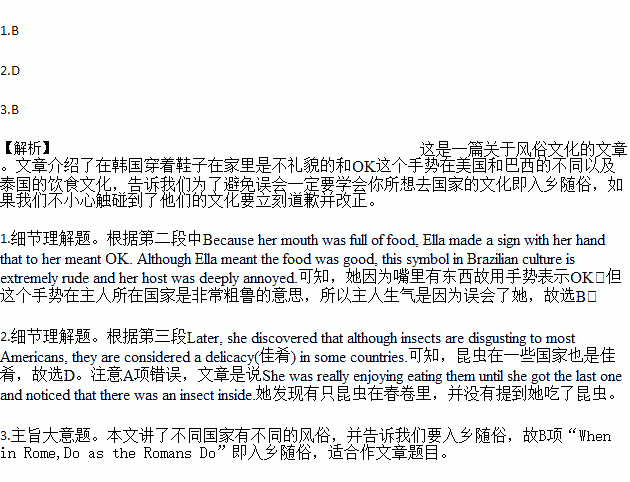题目内容
In Korea, it is rude to wear shoes inside someone’s house because it is considered dirty. In Saudi Arabia, you should not bring food to someone’s house because taking food or drink suggests that you think the host cannot afford the meal. More and more people around the world are travelling abroad to study, to go on vacation, or to work, and while it can be a great way to learn about other cultures, there may be times when travelers accidentally annoy their host.
The same gesture can have very different meanings in different countries. The gesture meaning OK in the United States means something completely different in Brazil as Ella Yao discovered. Ella had travelled to Brazil to study and was living with a host family. During dinner, her host asked Ella if she was enjoying the meal. Because her mouth was full of food, Ella made a sign with her hand that to her meant OK. Although Ella meant the food was good, this symbol in Brazilian culture is extremely rude and her host was deeply annoyed.
While travelling in Thailand, Elizabeth Brown learned that there are differences in food in the United States and Thailand. She stopped at a small, family-owned restaurant in Chiang Mai and ordered spring rolls. She was really enjoying eating them until she got the last one and noticed that there was an insect inside. She complained to the server. Later, she discovered that although insects are disgusting to most Americans, they are considered a delicacy(佳肴) in some countries.
All these mistakes can be avoided with some research on cultural differences before you go abroad. However, if you do accidentally annoy someone, quickly apologize, and learn from your mistake.
1.For what reason did Ella make her host angry?
A. She spoke with her mouth full.
B. Her host misunderstood her gesture.
C. She didn’t like the meal her host prepared.
D. Her host didn’t like using body language.
2.What happened to Elizabeth Brown in a Thai restaurant?
A. She ate an insect. B. She was badly treated.
C. She argued with the server. D. She learned insects are welcome there.
3.What may be the best title for the text?
A. What matters B. When in Rome
C. How to be polite D. Why make mistakes
 智能训练练测考系列答案
智能训练练测考系列答案
